How to Get Rid of Maggots in Garbage Can
Are you wondering how to get rid of maggots in your wheelie bin? A maggot infestation in your wheelie bin isn't uncommon, but it's also not nice. Luckily, there are ways to quickly and safely stop maggots in their tracks.
Maggots are fly larvae, usually of the common house fly. Attracted to food and other rubbish, you will only have a problem with maggots if flies have easy access to your waste and dustbins. If flies settle on your rubbish, they may lay eggs which can hatch out as maggots within 24 hours.
While maggots and flies can become a problem any time of the year, they are especially prevalent during spring and summer when flies are more active. Generally, maggots live for around five to six days before turning into pupae and eventually transitioning into adult flies.
We asked David Cross, Head of Technical Training Academy at Rentokil Pest Control and Natalie Bungay, Technical Officer at the British Pest Control Association, to give us the lowdown on what maggots are, what causes them and how to get rid of them for good.
What are maggots?
"Maggot is the general name given to fly larvae," David says. "Like flies, there are many species of maggot. They have a distinctive conical shape and typically cream or light brown colouring, with a dark mark on their posterior end which is a breathing hole. Maggots do not have teeth – instead they have mandibles that help them grasp food that has been broken down by the ridges on the exterior of their bodies.
"Flies lay their eggs on food sources to enable larvae to start eating from the moment they hatch. Over the course of several days maggots feast and prepare to pupate – where they form a hard shell and become a fly. Flies can lay a large number of eggs at a time, so maggots are often seen in large groups, but they have cannibalistic tendencies. One study by University of Lausanne found that even though fruit flies are vegetarian, they have been known to eat other maggots if one becomes injured."
What causes maggots?
"Flies have a relatively short lifecycle and a quick gestation period," says David. "For a large portion of their lifecycle flies exist in the form of larvae (maggots).
"While the odd fly on your premises is unavoidable at times, the presence of maggots can be prevented. Flies lay their eggs in places that offer the best chances of survival, as a result you are most likely to see them in large clusters on food sources such as decomposing organic matter. Keeping your home, garden and driveway clean and ensuring bins are regularly emptied will go a long way to preventing maggots from appearing. Rentokil has also developed its Mini Fly Box, which can be fitted inside food waste bins, attracting and killing flies using an insecticide, before they have the opportunity to lay eggs on food waste."
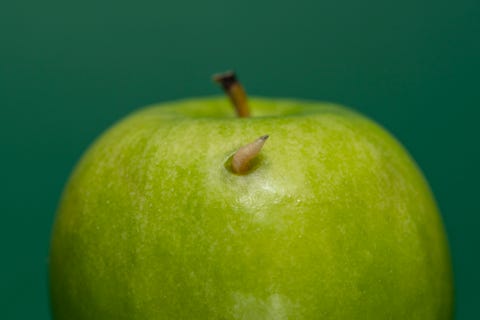
carlp778 Getty Images
Are maggots harmful to humans?
"Maggots are a delicacy in many parts of the world. However, consuming uncooked larvae can lead to bacterial poisoning as there is a chance they could have come in contact with faeces or rotting organic material," David says.
"While their adult counterparts are commonly known pests due to their irritating nature and their ability to spread disease, maggots can actually help save lives. Certain species of maggots, that are carefully and hygienically farmed in laboratories, can be used to feed on rotting flesh to help clear out bacteria infected tissue from wounds. Around the globe this treatment has helped to save countless limbs from being amputated. They can also be used in crime investigations to help estimate the time of death of a deceased person."
Natalie adds: "[Maggots] can cause contamination of food products which in turn is a violation of the food hygiene regulations. Depending upon their food source, they could contaminate food surfaces too which may in turn raise the risk of food poisoning."
Does salt kill maggots?
"The lifespan of a maggot is between 15 to 30 days, so if you want to get rid of them before they evolve into flies, you can try covering their food source with salt to eliminate their access to water," David says. "This method tends to be effective when the pests are confined to a small area, however it may not be as effective in a more open space as the maggots can travel to find a new food source."
Are there natural ways to get rid of maggots?
"If the maggot issue is contained, there are a few options you can try to get rid of them naturally," says David. "For example, pouring boiling water over the problem area, drawing maggots in with a container of beer, or using a vinegar and water mixture to kill them, can work in some instances. However, as with most natural remedies, these will only be effective if you are facing a small infestation. If the problem persists it's always advisable to consult a professional pest controller. Parasitic wasps can also be helpful in areas prone to heavy fly activity such as landfill sites or slurry pits, as they will feed on the maggots. However, it is debatable how successful this is as a form of pest control."
Natalie adds: "Identify what the maggots are feeding on, clean/clear this up (along with the maggots themselves) and dispose of it in a sealed bag in an external bin. By removing the food source of the maggot, you will deprive any remaining maggots and they will not be able to grow or survive. Regular cleaning, good hygiene and vacuuming will help control and prevent."
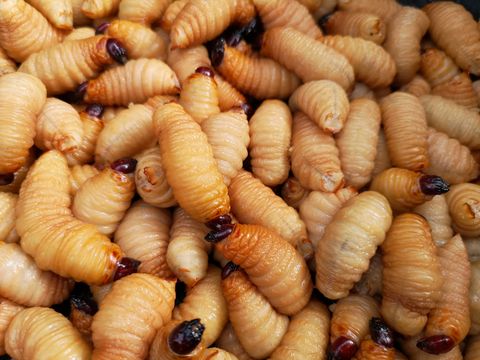
Thn Phl Phay Ngein / EyeEm Getty Images
What to do if you have a maggot infestation in your wheelie bin?
"As with most pest issues, prevention is better than a cure, so ensuring your bin is sealed and food scraps are covered in the first instance can prevent maggots from arriving altogether," David says. "If you do find your wheelie bin facing a maggot problem, you should arrange for it to be cleaned out thoroughly the next time it is emptied. Also Rentokil's Mini Fly Box helps to kill flies inside your bins, preventing them from laying the eggs which hatch into maggots."
Natalie adds: "Get your bin emptied and wash it out. Don't put lose food waste in the bin, make sure it is always bagged up/sealed so that flies cannot get access to lay their eggs.
"Remember, if you're having trouble with maggots that you can't deal with yourself, call in a professional. They'll be able to find the source of the infestation and treat without the risk of further damage. Qualified, audited and insured pest management companies can be found on the BPCA website."
6 natural products to keep flies out of the home
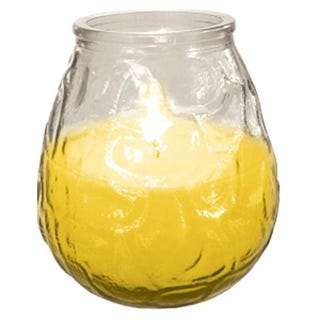
Outdoor Citronella Candle In Glass Jar Fly Insect Repeller Repellent
Price's Candles amazon.co.uk
£5.98
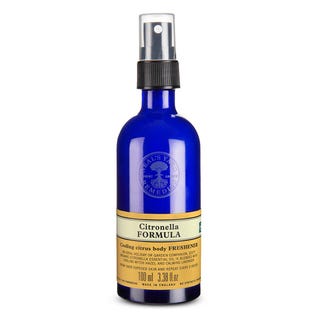
Bath & Body
nealsyardremedies.com
£9.50
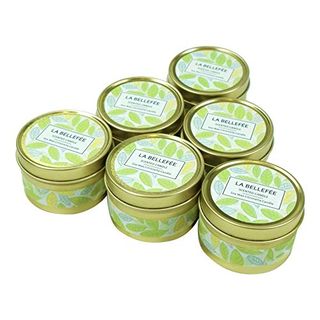
Outdoor Citronella Candles set Travel Tin
LA BELLEFÉE amazon.co.uk
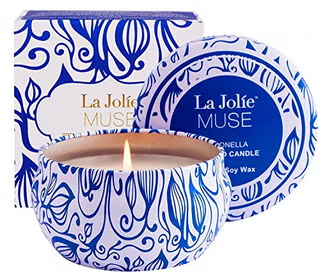
La Jolíe Muse Citronella Candle Mosquito Fly Insect Repellent 100% Soy Wax Travel Tin Indoor and Outdoor 45Hours
La Jolíe Muse amazon.co.uk
£11.99
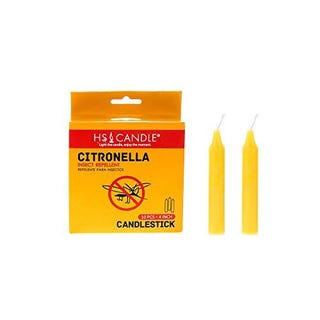
HS Candle 10 pcs Citronella 4
HS Candle amazon.co.uk

Citronella Essential Oil
Gya Labs amazon.co.uk
US$9.99
This content is created and maintained by a third party, and imported onto this page to help users provide their email addresses. You may be able to find more information about this and similar content at piano.io
How to Get Rid of Maggots in Garbage Can
Source: https://www.countryliving.com/uk/homes-interiors/gardens/a29086481/how-to-get-rid-of-maggots/